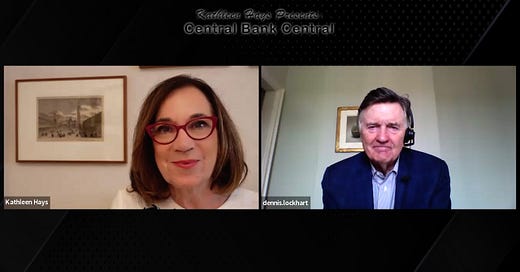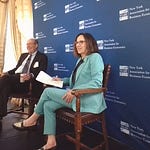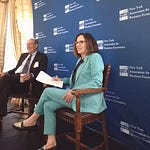Dennis Lockhart is a former president of the Federal Reserve Bank of Atlanta. I always like to speak with “been there done that” people like him who have actually been top officials at the Fed, and have sat around the big table at the Board of Governors in Washington to hammer out policy decisions.
What I especially like about Dennis is that somehow he always manages to distill down what the FOMC signals in the tersely worded policy statement it issues at the end of each meeting, and to catch the key words and phrases Chair Powell uses at his post meeting press conference.
Today in our interview I had to point out that he has been notably prescient in our pre-FOMC interviews this year.
Let’s look at the January meeting preview. In December the Fed’s Dot Plot signaled at least three rate cuts by the Fed in 2024, the big pivot that got markets got all fired up. When I asked Dennis what he expected at the coming January meeting he said - here’s my headline - the “Solid Economy Allows Fed to Wait and See on Rate Cuts Even as Inflation Falls” and that jobs and price data would be key to the March meeting rate decision. In fact that Fed did nothing at the meeting because inflation had started rising again.
In March he warned that the March Dot Plot could be less aggressive than the December Dot Plot which in fact it was. He said the recent inflation and jobs data could “disturb” the “relentless inflation” picture that had driven the Fed to its December rate cut stance.
What especially caught my ear in this interview was when he raised the possibility of only two rate cuts this year, not starting till September. Exactly where we are now, right?, which Dennis saw as a possibility at in March, and what was a long way from what markets - and many Wall Street economists - were expecting then. Over and over markets argued for, predict imminent rate cuts.
He also said ahead of the March meeting that depending on how the data might look by September, and how on the fence officials might be about starting rate cuts, they might decide to skip a September rate cut. But how would they get the two 2024 rate cuts done that the Dots suggested? He pointed out that the November meeting would take place two days after the elections. And with one more meeting in December, the FOMC could make two rate cuts happen then, by the end of the year, if needed.
Here’s one more prescient call. In our June meeting preview here on Central Bank Central, he said the Dots could signal just one rate cut this year and that some might predict no rates at all- exactly what happened!
So what does Dennis see now for the July meeting? Nothing will happen. Officials are waiting for three key inflation reports and two big jobs reports to determine what they do at the September meeting. While some former Fed officials have made high profile calls for the Fed to start cutting rates now, because they see the labor market is starting weaken, he does not agree. Instead he says the economy is back in better balance between with the labor market now less tight as unemployment rises, and inflation down but sort of stuck at 2.5%, 2.6%. He says the Fed needs to see what happens in August and September to decide on a mid-September rate cut so for now it waits and sees.
Dennis expects Chair Powell to be “very cautious” about what he says at his post-meeting press conference this week. “One (reason) is that the consensus of the Committee hasn’t really gelled yet and the data coming in are going to be very important to see.”
Also “the second (reason) is that he really shouldn’t get ahead of the his committee and if the committee opinion is mixed and may not even be discussed all that much in this meeting then he would have to be cautious about that.”
So what does Dennis expect from the FOMC meeting?
”I think they’re feeling their way along, “ he says. “They’re in “nurture mode” to coin a phrase.”
”What I mean by nurture mode is a soft landing is underway,” he says. “They certainly don’t want to spoil it.”
As for the September meeting, Dennis says if the inflation data are still ambiguous, not showing a lot of progress but not showing deterioration and if the employment data show a tightening labor market “so that people can continue to get jobs….I think they wait.”
But don’t you wait. Listen now.
Dennis P. Lockhart (born February 1, 1947) is an American economist. He was the 14th President and CEO of the Federal Reserve Bank of Atlanta, serving from March 1, 2007, [1] through February 28, 2017.[2]
Education
[edit]
Lockhart earned a B.A. in political science and economics from Stanford University in 1968 and an M.A. in international economics and U.S. foreign policy from Johns Hopkins University's School of Advanced International Studies in 1971. He served as a lieutenant in the U.S. Marine Corps Reserve from 1968 to 1974.[1]
Financial career
[edit]
Lockhart held various positions, both domestic and international, with Citicorp/Citibank (now Citigroup) between 1971 and 1988. Early in his career with Citibank, he served in Saudi Arabia, Greece and Iran. From 1978 to 1986, he served in Atlanta as senior corporate officer of the Southeast office of Citibank.
From 1987 to 1988, he was head of the firm's Latin American debt-to-equity swap investment program, designed to restructure sovereign debt.[1] He worked for thirteen years (1988-2001) at Heller Financial,[3][4] where he served as executive vice president and director of the parent company[citation needed] and as president of Heller International Group[3] until Heller was purchased by General Electric in 2001.[5]
From 2001 to 2003, he was managing partner at the private equity firm Zephyr Management, L.P., based in New York with activity in Africa and Latin America.[1] From 2002 to 2007, he served as chairman of the Small Enterprise Assistance Funds, a sponsor/operator of emerging markets venture capital/private equity funds. In 2000, he served as chairman of the advisory committee of the U.S. Export-Import Bank.[3]
Lockhart serves on the board of directors and executive committee of the Metro Atlanta Chamber of Commerce, on the board of directors of St. Joseph's Health System, and is a trustee of Agnes Scott College and the Atlanta International School. He also chairs the World Affairs Council of Atlanta and the Midtown Alliance.[3]
Academic career
[edit]
From 2003 to 2007, Lockhart served on the faculty of the Master of Science in Foreign Service Program at Georgetown University's Walsh School of Foreign Service. In this role, Lockhart was chairman of the program's concentrations in international business-government relations and global commerce and finance, while teaching courses in international investment, global business strategy, and other subjects.[1] He also was an adjunct professor at Johns Hopkins University's School of Advanced International Studies.[3]













Share this post